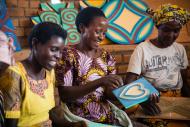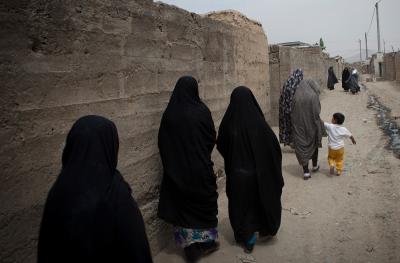At a time when women’s rights are at risk and conflict continues to rise among other worldwide crises, women leaders are a necessity. Around the world, women leaders have proven crucial to efforts combatting coronavirus and in movements towards equity but especially, we need women who advocate for and advance women’s rights and power.
Women can lift one another up in many ways, from passing knowledge to protecting each other’s rights to supporting women’s economic growth. Our global community is made up of women who do just that, and we wanted to introduce you to just a few of them.
Latifa
Hailing from the Batwa community in Rwanda, Latifa grew up facing discrimination from many surrounding communities. She entered the Signature Program with traditional Batwa pottery skills and through the training supplemented her knowledge with self-confidence, learning her rights, business skills, and advanced vocational trainings in Imigongo — a Rwandan art form.
Combining all those skills, Latifa grew her business, built a home, and sent her children to school. With her big dreams and confidence, she challenged taboos about marginalized women becoming leaders, and got elected to a local government committee to represent women from her community. She inspires women in rural Rwanda as an example of socio-economic and political transformation while mobilizing other women to work hard and participating in community decision-making.
Gul Jan
Gul Jan fought for her right to an education in Afghanistan. Without her own regular income, she was reliant on just her father’s, and her family struggled with finances. Her own older brother tried to prevent her from continuing her studies. She convinced her father of the importance of completing her education and graduated from a nursing institute, but finding a stable income still proved difficult.
Through the Signature Program, she learned about advocacy and gained tailoring skills. Since then, Gul Jan has created a future for herself and other women. Using money from her group’s Village Savings and Loan Association, she bought a sewing machine and started a business. From marketing to business development, she started it all herself, even securing a partnership with a vendor.
Gul Jan dreamed even bigger, expanding into a tailoring center, where she now employs 15 more women so they can all earn an income.
“The program has brought positive changes for families and our community. Right now, families are allowing their daughters to go to school, university, and get jobs.
“Women in my community and I are excited about our opportunities and what we’ve achieved. We’ve gained self-esteem and self-sufficiency and are very thankful for Women for Women International.”
Yitpinwa
When COVID-19 struck, there was a dearth of reliable health resources and information to protect people. Women leaders in Nigeria were the solution.
In Pankshin, the local government recruited Change Agents like Yitpinwa, recognizing their knowledge about health and hygiene as well as their leadership skills.
“I represent the Change Agents in a committee set up by the local government for education and awareness about COVID-19. We Change Agents are only 15 members, and we go round to communities in the local community to create awareness and teach our people about the coronavirus.”
As part of the committee, Yitpinwa stands alongside representatives from the ministry of health, traditional and religious leaders, and Hausa-Fulani herders. Then she ventures out with a loudspeaker, vehicle, and her fellow women leaders to do demonstrations on mask-wearing, handwashing, and social distancing. In a time when women’s safety and incomes are at risk while they shoulder caretaking responsibilities and their families’ health, Yitpinwa is an important example of why women’s leadership still matters.
“I am happy that I use the knowledge I got from Women for Women International to be part of preventive measures against coronavirus.’’



